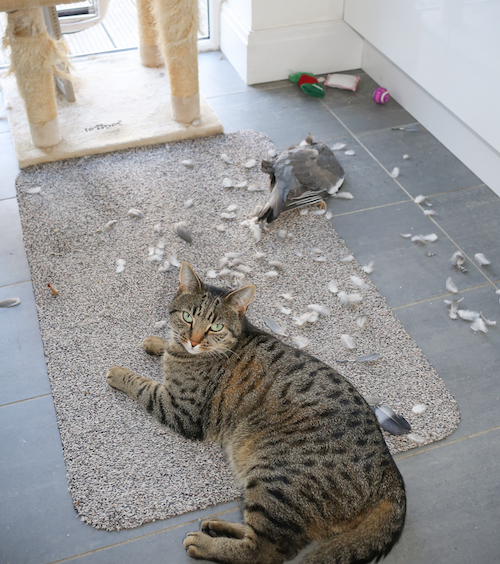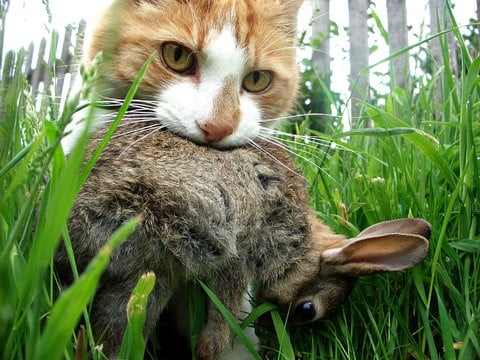It might be fair to say that some cat owners think that their domestic cat is occasionally mean and nasty because they feed their cat well but they still hunt when allowed outside. They still bring in mice and birds, an ongoing source of consternation and exasperation. This perception paints an unkind picture of the domestic cat. It is a characteristic which is used against them by ornithologists and people who dislike them.

But some owners need to understand that the motivation to hunt and the sensation of hunger are distinct attributes of the domestic cat (Bradshaw 1992). If they know this it may help stop them forming negative ideas about cats.
A well fed cat is motivated to hunt provided the sensory stimulation is out there. By this I mean the sight and sounds of prey animals. The domestic cat is often more motivated by sounds initially and then the fleeting sight of a prey animal moving perhaps in long grass will in combination trigger the instinct to hunt. There may be ambivalence on the part of the cat to engage if they perceive the hunt as dangerous to them or the likely success too low.
This characteristic is understandable in terms of survival. And by survival we have to refer back to the wild cat ancestor of the domestic cat namely the Near Eastern Wildcat.

The argument is that if hunger was a trigger for hunting “it would mean that cats would already be slightly debilitated at the onset of the hunting sequence” (the words of S.E. Heath). And domestic cats need to maximise their hunting success. Research by Corbett in 1979 into the hunting success of domestic and feral cat showed that their success rate when hunting rabbits was as low as 17 percent.

With such a low success rate, if the trigger hunt was only on hunger, it would put cats into a potentially vulnerable position. Physical weakness would jeopardise further the success rate.
It is, as ever, about maximising the chances of survival. You cannot blame the cat for this innate motivator. Humans do the same thing. Perhaps the problem with humans is that they sometimes forget that the domestic cat has all the characteristics of a wild cat which is sometimes masked by their domestication and living in the human home. They are “pets” and sometimes anthropomorphised. Humans sometimes incorrectly judge them by human standards. Let them outside into a field or the countryside and you see an animal which is almost identical to their wild ancestor.


What a retard you are, allowing your domestic cat to kill natural fauna, then associating inbred corruption domestic cats with beautiful natural felinae fauna. And then you caluim feral cats are not responsible for bird declines, when islands have been wiped of all the terns and seabirds from these cats. My local parks warblers have been killed 20-30 times since someone released a cat there. I am a naturalist, not a anthropocentriost, humans are cancer and so are the self centered humans who value corruptions (materialism and domestic animals) of modern humans above the natural world.